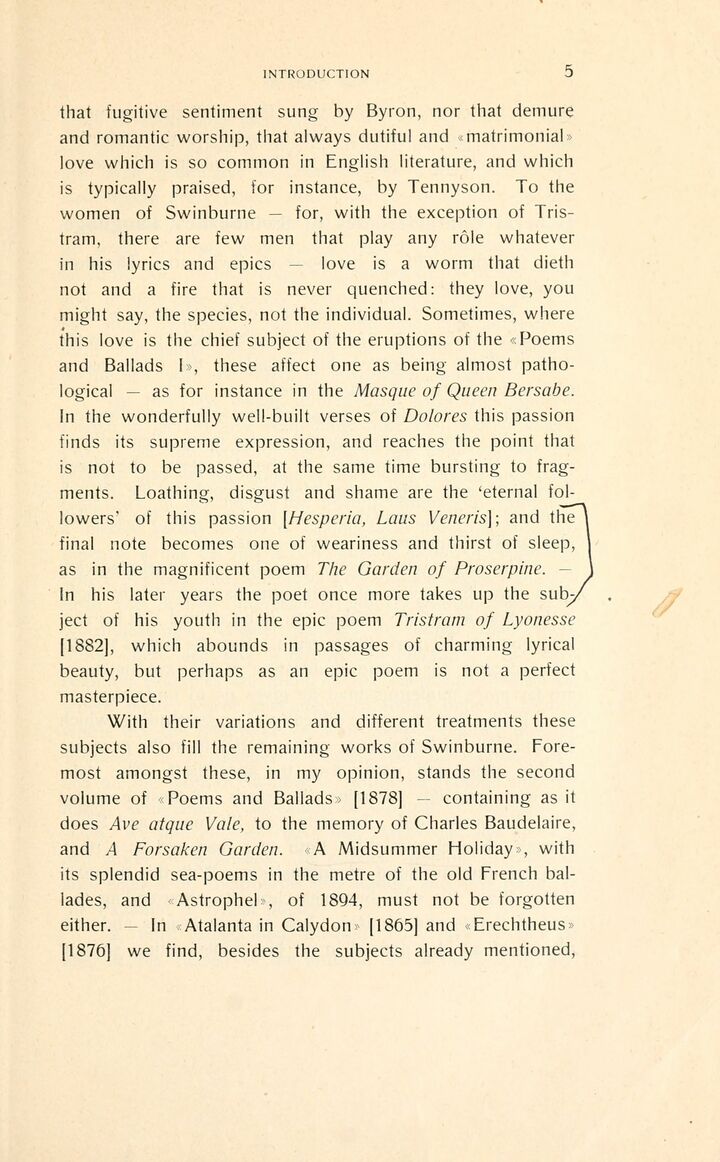
Full resolution (JPEG)
- On this page / på denna sida
- Sidor ...

<< prev. page << föreg. sida << >> nästa sida >> next page >>
Below is the raw OCR text
from the above scanned image.
Do you see an error? Proofread the page now!
Här nedan syns maskintolkade texten från faksimilbilden ovan.
Ser du något fel? Korrekturläs sidan nu!
This page has never been proofread. / Denna sida har aldrig korrekturlästs.
5 INTRODUCTION
that fugitive sentiment sung by Byron, nor that demure
and romantic worship, that always dutiful and «matrimonial»
love which is so common in English literature, and which
is typically praised, for instance, by Tennyson. To the
women of Swinburne — for, with the exception of
Tristram, there are few men that play any role whatever
in his lyrics and epics — love is a worm that dieth
not and a fire that is never quenched: they love, you
might say, the species, not the individual. Sometimes, where
*
this love is the chief subject of the eruptions of the «Poems
and Ballads I», these affect one as being almost
pathological — as for instance in the Masque of Queen Bersabe.
In the wonderfully well-built verses of Dolores this passion
finds its supreme expression, and reaches the point that
is not to be passed, at the same time bursting to
fragments. Loathing, disgust and shame are the ’eternal
followers’ of this passion [Hesperia, Laus Veneris]-, and the
final note becomes one of weariness and thirst of sleep,
as in the magnificent poem The Garden of Proserpine.
In his later years the poet once more takes up the sub-,
ject of his youth in the epic poem Tristram of Lyonesse
[1882], which abounds in passages of charming lyrical
beauty, but perhaps as an epic poem is not a perfect
masterpiece.
With their variations and different treatments these
subjects also fill the remaining works of Swinburne.
Foremost amongst these, in my opinion, stands the second
volume of «Poems and Ballads» [1878] — containing as it
does Ave atque Vale, to the memory of Charles Baudelaire,
and A Forsaken Garden. «A Midsummer Holiday®, with
its splendid sea-poems in the metre of the old French
ballades, and «Astrophel», of 1894, must not be forgotten
either. — In Atalanta in Calydon» [1865] and «Erechtheus»
[1876] we find, besides the subjects already mentioned,
<< prev. page << föreg. sida << >> nästa sida >> next page >>
Project Runeberg, Tue Dec 12 01:39:05 2023
(aronsson)
(download)
<< Previous
Next >>
https://runeberg.org/swinburnes/0015.html



